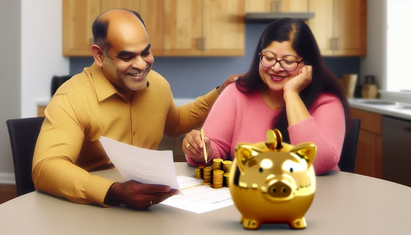Mortgage Rate Comparison Shopping Guide
Written by:
Ashley Altus
Ashley Altus
Certified Financial Counselor
Ashley Altus is a writer and certified financial counselor through the National Association of Certified Credit Counselors.
See full bio
Fact Checked by:
Patrick Boyaggi
Patrick Boyaggi
CEO an Co-Founder
Patrick is the Co-Founder and CEO of Own Up. He has a wealth of experience and knowledge as a mortgage executive.
See full bio

Fast Links
- What is a mortgage?
- How do mortgage rates work?
- How are mortgage rates decided?
- What’s considered a good mortgage rate?
- Why You Should Compare Mortgage Rates
- Comparing Home Loan Estimates
- How to Get the Best Mortgage Rate
- How many mortgage offers should you compare?
- How do you compare mortgage lenders?
- Choosing a Loan
- Comparing rates doesn’t have to be hard
- Bottom Line
For most people, a home is the biggest purchase of their lives. It’s normal to feel a bit excited and simultaneously overwhelmed at the thought of owning a home.
It's time to start mortgage shopping once you've determined your priorities and budget. Finding the right mortgage to pay for your new home makes all the difference. Comparing mortgage rates is key to ensure you’re getting a fair deal. It’s more effort, but likely to pay off big time.
What is a mortgage?
Simply put, a mortgage is a loan that allows people to buy real estate without paying all the money upfront. A borrower agrees to pay back the loan with interest to the lender over an agreed period of time.
Mortgages are secured loans. In this case, the collateral is the home. If you can’t repay the loan, the lender can foreclose on – meaning they can take possession of – the home in an effort to recoup the outstanding debt.
How do mortgage rates work?
A mortgage rate is the interest rate you’ll pay on the loan, but that doesn’t show the entire cost of a mortgage. While finding a loan with a low interest rate may be a borrower’s top priority, it’s not the only cost to consider.
The APR, the annual percentage rate, combines interest and fees expressed as a percentage. Think of the APR as the true cost for the loan. The APR for a mortgage may include additional expenses such as closing costs, origination fees, and mortgage insurance.
Loans can have the same APR, but can have different interest rates. One loan estimate may offer a lower rate than another, but it could mean paying more fees upfront. You’ll want to compare APRs and interest rates when shopping for a mortgage.
How are mortgage rates decided?
Numerous factors impact mortgage rates. Everything from the current economic and political climate, a borrower’s financial profile, the lender, and the terms and conditions of the loan all work together to influence mortgage rates.
The Federal Reserve
The Federal Reserve doesn’t set mortgage rates, but their actions do influence rates. If the Fed increases the effective federal funds rate, which is the benchmark interest rate that banks use to lend money to each other, the increase is then usually passed on to borrowers too.
Economic and Political Components
When the economy is in a growth period, rates tend to be higher. As the economy slows, rates tend to decrease in order to attract consumer spending. Inflation, the unemployment rate, and elections also impact how lenders set their rates.
A Lender’s Risk Appetite
Mortgage rates vary from lender to lender because there isn’t an exact formula that determines them. Every lender has a different risk threshold they’re willing to take on and a specific method for calculating the rates they extend to borrowers. Some lenders may choose to minimize potential losses by charging riskier borrowers higher interest rates.
Mortgage Points
To lower your interest rate and monthly payment, you may consider mortgage points, also known as discount points, if you’re willing to pay more upfront. You may see this referred to as “buying down the rate.” The interest rate reduction from buying mortgage points will differ between lenders and be influenced by the current interest rate market trends and conditions.
Home Location
Lenders and online mortgage calculators ask for your zip code for a reason. Mortgage rates can vary depending on where the property is located.
Credit Scores
Lenders use credit scores to determine a borrower’s risk. In general, lenders see borrowers with excellent credit as more likely to make on-time mortgage payments. Borrowers with poor credit scores represent a greater risk to lenders, which will affect the rates they’re offered.
Down Payment Amount
Borrowers that pay a large percentage of a home’s price upfront are favored by lenders. If you borrow less, you’ll have less to pay back, which can impact the loan’s interest rate and monthly payment.
Loan Term
Lenders typically offer mortgages with 15-, 20-, or 30-year repayment terms. With a longer loan term, you’ll likely pay more interest over time, but with lower monthly payments. With shorter loan terms, you’ll pay less interest overall, but have to compensate with a higher monthly payment.
Loan Type
Rates can differ greatly depending on the type of loan you choose. There are conventional, FHA, USDA, and VA loans. Each loan type has their advantages and disadvantages, so you’ll want to choose a loan type that best suits your financial goals.
Interest Rate Type
Borrowers can choose a fixed-rate mortgage or adjustable-rate mortgage. Both of these loan types can impact your interest rate and monthly payment.
Fixed-rate Mortgage
Home loans that use a set interest rate throughout the life of the loan belong to the fixed-rate mortgage category. This makes monthly home payments simple to calculate, as they will always be the same amount. No matter what’s happening in the housing market, you’ll be shielded from sudden spikes.
Adjustable-rate Mortgage
Lenders also offer borrowers home loans with interest rates that can change during the loan term. The adjustable-rate mortgage has a fixed introductory rate that remains constant for a set amount of time. After this initial fixed period, interest rates change based on economic market conditions or solely on the terms of the loan.
What’s considered a good mortgage rate?
A good mortgage rate will look different for everyone based on their financial profile, lender, loan type, loan term, and other variables.
Mortgage rates change regularly, sometimes even hourly. While there is no set definition of a good mortgage rate, the lower the rate, the less you’ll have to pay for your home throughout the term of the loan.
It is important for borrowers to shop around, because rates can vary so much that it is impossible to know if they are getting a good deal without comparing their options.
Why You Should Compare Mortgage Rates
Borrowers can determine if they’re getting the best deal by comparing loan estimates from several lenders. Lenders will provide loan estimates after a borrower submits a mortgage application.
Shopping around to find a competitive mortgage rate can help borrowers save money, feel confident in the home-buying process, and gain more knowledge about mortgage-related issues, according to the Consumer Financial Protection Bureau (CFPB).
Mortgage rate shopping makes a difference. Rates can differ greatly between lenders. Interest rates can fluctuate by more than half of one percent for borrowers with similar financial profiles looking to qualify for similar loans, according to a CFPB Office of Research Working Paper Series.
Comparing Home Loan Estimates
No two home loan estimates are identical. Request home loan estimates from all the lenders you’re considering to uncover all the costs that come with financing. Loan estimates are a formal document that will break down all the costs of the loan.
Review the home loan estimates in detail to see how they compare. Start with the basics such as:
- The loan amount
- Monthly principal and interest payment
- Total monthly costs, which will include the total for expenses such as:
- Principal: The amount of money borrowed to purchase the property.
- Interest: The cost of borrowing that money, often expressed as Annual Percent Rate (APR).
- Lender credits
- Upfront loan costs
Taking a closer look at all the fees associated with a mortgage can help you understand the true cost of a loan. Here’s an overview of some of the common fees you may encounter in a typical loan estimate:
Costs at closing
Lenders will estimate the amount borrowers need to pay upfront to close the loan. This includes:
- An estimate of cash needed to close
- The amount of cash borrowers will need to show they have available
- Closing costs, which are upfront costs
Private mortgage insurance (PMI)
The cost of PMI isn’t factored into your interest rate, but it is included in your APR. Conventional lenders view borrowers who can’t put down at least 20% of the home’s purchase price with a bit of skepticism.
Your loan-to-value ratio, a measure that compares the mortgage amount with the appraised value of the property and credit score factor into determining your monthly PMI cost. The good news is that there are certain conditions under which lenders remove PMI. This includes when your mortgage balance falls to 80% of your home's original value, which should have been provided in a PMI disclosure form. You can also request earlier cancellation if you make additional payments that reduce the principal balance to 80% of the original value.
Prepayment penalty
Some lenders charge you a prepayment penalty if you pay off part or all of your loan early. In many cases, a prepayment penalty kicks in if you pay off your entire mortgage balance.
How to Get the Best Mortgage Rate
Borrowers with excellent credit scores, consistent income, low debt-to-income ratio, and large down payments are attractive to lenders. These types of borrowers get the most competitive interest rates. In the eyes of the lender, this type of borrower is more likely to make mortgage payments reliably over the life of the loan.
How many mortgage offers should you compare?
When it comes to comparing mortgage offers, you can never have too many. The more options you seek out, the better your chances of securing the best offer for your financial profile. When looking at the different mortgage offers, it’s important to compare more than just the interest rate. You will also want to compare fees and loan terms to help decide which quote is the best for your individual situation.
Borrowers who sought five offers saved on average $3,000 over the life of a $250,000 home loan, according to research from Freddie Mac. Even just obtaining one more quote could save you money. In the same study, borrowers who sought an additional quote saved $1,500 on average.
A lender will typically conduct a soft credit check when they provide a mortgage quote. However, when you formally apply for a mortgage loan, they will then conduct a hard credit-check. Be aware that multiple hard credit checks can have a detrimental effect on your credit score, so it’s important to only submit one mortgage application.
How do you compare mortgage lenders?
Borrowers have a variety of options when it comes to mortgage lenders. Conventional banks, credit unions, nonbank mortgage lenders, mortgage brokers, and mortgage marketplaces can all offer you the type of loan you’re looking for, but each of these lenders gives borrowers a specific experience. What works for one borrower, may not work for you.
Choosing a Loan
After reviewing all the costs line by line, see how the mortgage quotes stack up against your budget.
Just because a lender has given you a loan estimate, doesn’t mean you’re obligated to commit. Don’t feel pressured to accept a loan estimate that makes you uncomfortable.
Once you feel confident about your loan estimate, notify the lender to proceed with your application. It’s important to note that loan estimates can expire. If a particular loan offer is the right fit for you, you’ll have 10 business days from receiving it to express your intent to proceed.
Comparing rates doesn’t have to be hard
Your mortgage lender will customize your interest rate based on your financial situation. For that reason, consider all your options when searching for a mortgage that fits your budget, preferences, and financial needs. You’ll reap the rewards in the long run by locking in the best loan you can find.
Bottom Line
Comparing mortgage rates and loan estimates is a crucial step in finding the best loan for your financial profile. By understanding the basics of mortgage rates and the loan estimate process, you can make informed decisions that will help you save money and get the best possible loan terms. With a little research and effort, you can find the right mortgage loan for your needs and secure your dream home with confidence.


